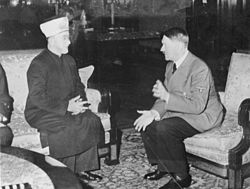![]()
Tue, June 18, 2013 | RubinReports | By Barry Rubin

Haj Amin al-Husseini meeting with Adolf Hitler on 28 November 1941 (Bundesarchiv, Bild 146-1987-004-09A / Heinrich Hoffmann / CC-BY-SA)
There is a long history of Western powers believing that they could manipulate or work with radical Arabic-speaking states or movements to redo the regional order. All have ended badly.
— During the 1880s and 1890s, Germany became convinced that it could turn the forces of jihad against British, French, and Russian rivals. The kaiser presented himself as the Muslim world’s friend and German propaganda even hinted that their ruler had converted to Islam.
— In World War One, the Germans launched a jihad, complete with the Ottoman caliph’s proclamation. Wiser heads warned that the Ottoman ruler didn’t have real authority to do so or that the raising of the jihad spirit could cause massacres of Christians in the empire. They were ignored.
As a result, few responded to this jihad; Armenians were massacred, at times with the at least passive complicity of the German government.
— Nevertheless, Adolf Hitler, whose close comrades included many veterans of the earlier jihad strategy, tried the same approach in World War Two. This time, the Jews in the Middle East were to be the massacred scapegoats. Yet despite close collaboration by the leader of the Palestine Arabs, Hajj Amin al-Husseini, and the Muslim Brotherhood, among others, the defeat of the German armies along with other factors (incompetence, unkept Arab promises, and German priorities) prevented this alliance from succeeding.
By the way, the Nazi collaborators were the same Muslim Brotherhood to which the United States is allied today. There are huge amounts of archival evidence, including documents showing Nazi payments to the Brotherhood and providing them with arms for a rebellion to kill Christians and Jews in Egypt.
There is no evidence that the Brotherhood has changed its positions. The story above is told in a new book, by Barry Rubin and the brilliant scholar Wolfgang G. Schwanitz, Nazis, Islamists, and the Making of the Modern Middle East which will be published by Yale University Press in January 2014. It will be an explosive rethinking of Middle Eastern history which could not be more timely.
Incidentally, might one think that the Western mass media might mention that the chief U.S. ally in the Arab world — one of whose branches is now receiving American weapons — were Nazi collaborators who have never abandoned their anti-Western, anti-Christian, anti-Jewish views?
How much has the Brotherhood visibly reconsidered its ideology since the man who is still its leader, Muhammad al-Badi, explained in October 2010 that the Egyptian regime would be overthrown and then the Brotherhood would wage jihad on a weak and retreating America?
— In 1939 the British offered to sell out the Balfour Declaration and the promise of a Jewish homeland in order to gain Arab support in the coming war. The Islamist-radical nationalist faction rejected these offers, though moderate Arabs wanted to accept them. After World War Two, the British decided to try to secure their interests in the region. Most students are probably being taught today that this was through Israel’s creation. In fact, of course, the British were opposed to this outcome. They believed, understandably, that it would be better to court the Arabs. The result was the creation of the Arab League, a body that the British thought they could control. Of course, the Arab League would become a vehicle for anti-Western radicalism.
— During the early 1950s, the United States thought that it could do something both good and in its interests. It would support the takeover by moderate elements who would modernize their countries. No more would America be held responsible for corrupt dictators but would receive gratitude from liberated people living in prosperity.
The first case was encouragement for the Egyptian coup of 1952, the one which brought Gamal Abdel Nasser to power ultimately.
The result of the British and American efforts to harness radical Arab nationalism — which led to decades of violence and war in the region is told in Barry Rubin, The Arab States and the Palestine Conflict which you can read online or download for free. A variation of this reformist as a U.S. strategy took place in Iran, which you can read in Barry Rubin, Paved with Good Intentions: The American Experience and Iran which you can read online or download for free.
— Next, the Soviets tried and poured in a lot of money and weapons, believing that perhaps the radicalism of its allies would mean a long-term, beneficial partnership. That effort failed, too. Remember it was not so long ago that Egypt, Syria, and Iraq were Soviet allies. Now all that Russian investment is gone, too.
One of the forces the Soviets backed to gain influence was the PLO. While well-intentioned people initiated the “peace process” of the 1990s, arguing that power would moderate radicals and stabilize the region, that didn’t work out really well either.
— French policies of helping Ayatollah Ruhollah Khomeini (thus like decades earlier it helped the Palestine Arab Nazi collaborator Amin al-Husaini) in Paris, thinking that this was a way to extend French influence in the Middle East.
— While it was an understandable policy at the time, the United States backed a jihad in Afghanistan against the invading Soviets. It is not true that the United States backed Usama bin Ladin at any point. But after all, indirectly and unintentionally, didn’t the Taliban and al-Qaida and thus the September 11 attack on America grew out of these events?
Remember that was siding with the lesser of two evils — the Afghan jihadis — against the then equivalent of America’s Great Satan, the USSR. Might there be some parallels with the situation in Syria today? Get it: Iran is so bad that Sunni jihadis must be helped into power.
— And let’s not forget the arguably correct policy at the time of backing Saddam Hussein’s Iraq in the Iran-Iraq War of the 1980s. I supported that policy at the time but let’s remember that Iraq’s defeat also brought us two U.S. wars in Iraq and, ultimately, September 11.
Is there no one who remembers this recent history?
— Finally, there is today’s new, bright idea of the Obama Doctrine. What will history make of this American jihad? Different from the previous situations is that it is completely clear that the United States is backing people who hate it. At least its predecessors could delude themselves easily that this would work.
I take my stand with the brilliant Dutch area expert, C. Snouck Hurgronje. In 1914 — almost exactly 100 years ago, as World War One began, he was horrified by what he called this “jihad made in Germany.” Unleashing a plague of religious hatred, he warned, would bring violence and massacres beyond anyone’s control. Once the genie was not only let out of the bottle but funded and given small arms and perhaps anti-aircraft missiles it was very dangerous.
Hurgronje, however, offered hope, explaining, in his 1915 book:
“The jihad program assumes that the Mohammedans, just as at their first appearance in the world, continuously form a compact unity….But this situation has in reality endured so short a time [in the few years after its founding], the realm of Islam has so quickly disintegrated into an increasingly large number of principalities, the supreme power of the so-called caliph, after flourishing for a short period, has become a mere word….”
As we are already seeing, the Sunni-Shia conflict, increasingly a war, has divided the Muslim-majority world. There are ideological differences, ethnic ones, the ambitions of different nation-states to rule the empire, and the extremism that alienates potential Muslim and Western allies.
This is the main hope of the world at present because Western leaders have clearly not learned anything much about the Middle East in the last century
The fact is that backing radicals has never worked but only backing moderates or at least those who believe that their interests require stability and have gone through a real change of heart. Over and over again history has shown that backing radicals merely gets you more powerful radicals.
Have there been no successes? Of course there have, albeit in a different way. Containment, patience, and struggle against the radical forces. In Russia’s case that took 70 years; in China’s only about 50, and in Egypt (from the radical free officers to its moderation under Anwar al-Sadat) merely 25, though now Egypt has reverted since its society wasn’t fundamentally changed.
Thirty-four years ago — my, time flies when you’re having violent revolution, wars, and terrorism — I wrote a few months after Iran’s Islamist revolution that an entire generation would pass before the United States and Iran might reconcile. So far that prediction still holds. The same might well be true for the newer Islamist states.
Barry Rubin is director of the Global Research in International Affairs (GLORIA) Center and editor of the Middle East Review of International Affairs (MERIA) Journal. His latest book, “Israel: An Introduction“, has just been published by Yale University Press. Other recent books include “The Israel-Arab Reader” (seventh edition), “The Long War for Freedom: The Arab Struggle for Democracy in the Middle East” (Wiley), and “The Truth About Syria” (Palgrave-Macmillan). The website of the GLORIA Center and of his blog, Rubin Reports. His original articles are published at PJMedia.



 RSS
RSS










Latest Comments
Hello Mike, Thank you for your positive feedback to the article. I felt there wasn’t too much critical analysis of ...
Thanks for this considered and well constructed article. A follow up article on the manner in which the editorial contro...
THE CLUELESSNESS OF CLAIMING THAT OBAMA'S MIDDLE EAST POLICIES WERE A FAILURE CANNOT BE FURTHER FROM THE TRUTH, WHAT THE...
As long as Obama is the president of the usa do not trust the us government......
Thank you for an good read....